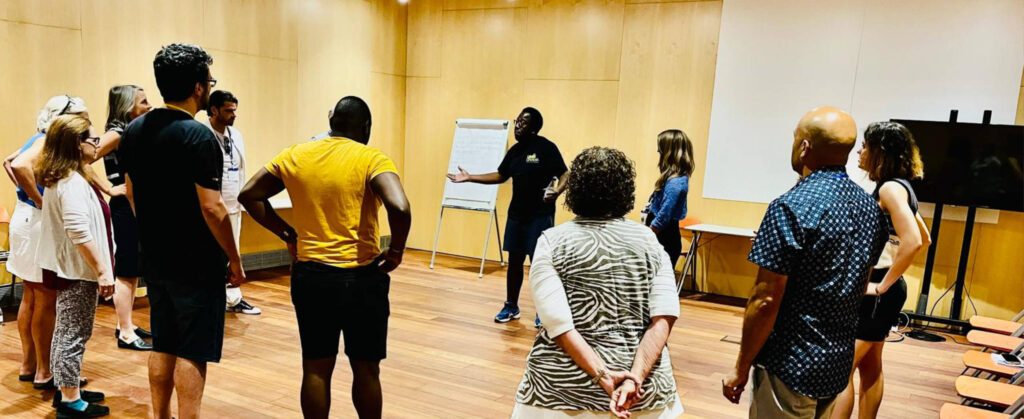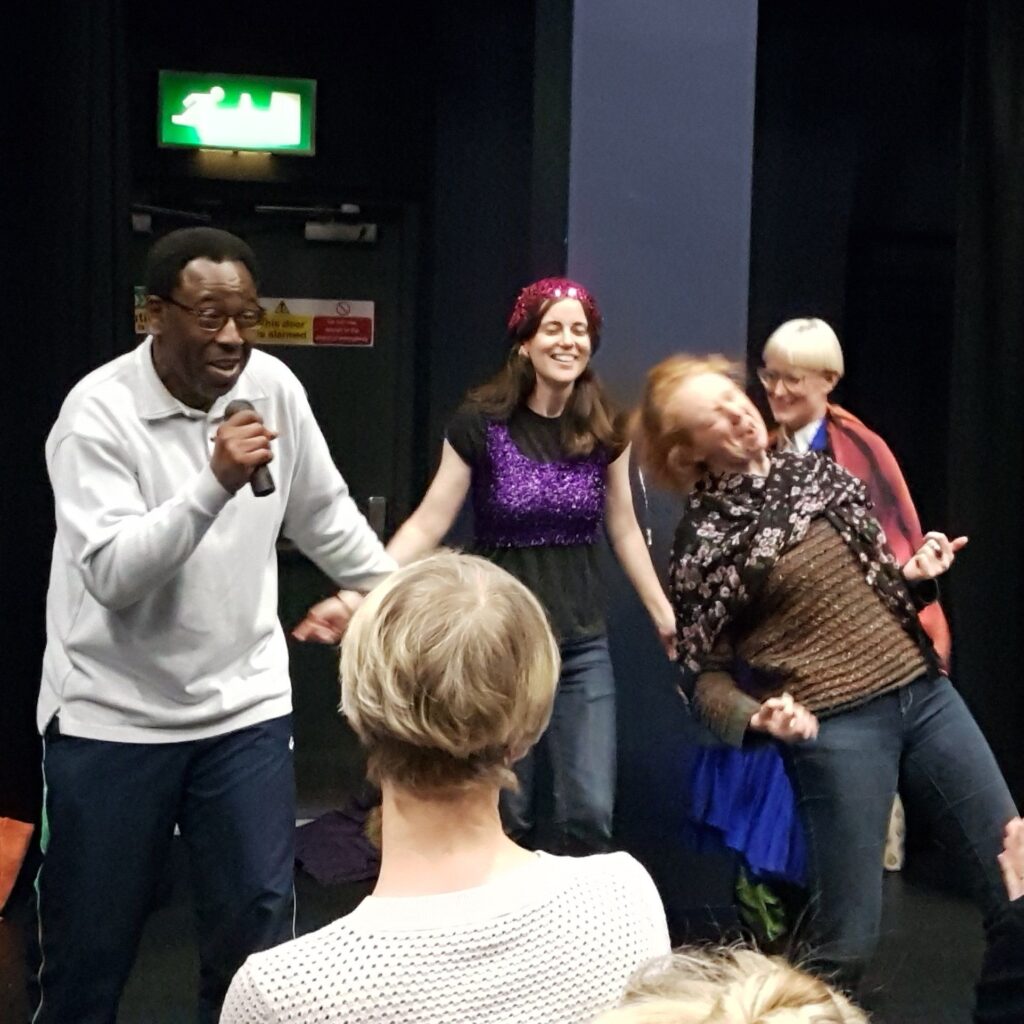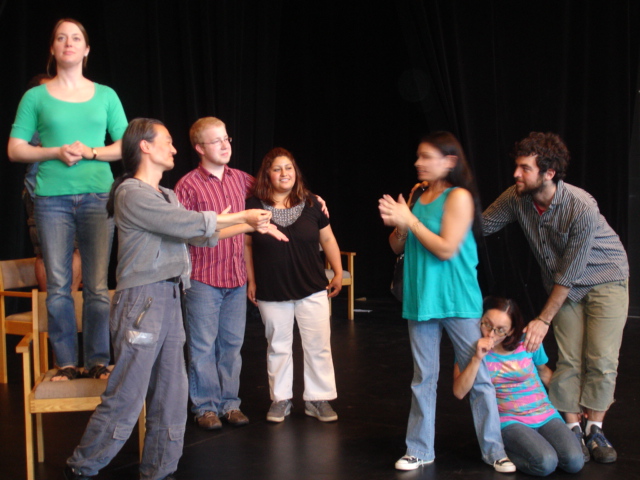How I Work
In planning and delivering my work I use a playful mixture of short highly focused creative-action-methods* and drama techniques to dynamize peoples thoughts, feelings and concerns around the issues that come up for them throughout the workshop process.

*Action methods include a rich variety of structured experiential methods used in organisational, educational, community and therapeutic settings. This may include group-building exercises and other activities such as group problem solving, developing and rehearsing new skills, interactive drama techniques, values clarification exercises and activities aimed at promoting new decisions and personal change. The methods are intended to engage the whole person, in mind, emotions, body and action.
Where possible and appropriate, I use: https://londonplus.org/creative-health-impact-framework/ and the https://www.culturehealthandwellbeing.org.uk/resources/creative-health-quality-framework
I use drama activities that develop and build people’s confidence and self esteem, sharpen thinking and communication skills and develop the person, influencing their physical, emotional and spiritual well-being and their perspective of the world. As well as being challenging and fun the process allows participants to review and re-evaluate their critical thinking
My facilitation processes include exploring and challenging oppression, dissecting and rehearsing everyday realities; it also has the potential to go beyond the rational realms of reality. I tend to look at new perspectives to old problems that can be acted out to prompt individuals to re-frame their own feelings and review their memories of experiences so that they gain insight into their own situations and reflect on the impact of their choices and decisions have on self, others and wider society.
To give you an example of how I might explore issues in a workshop, I tend to work at a level where the participant is feeling safe and comfortable. A problem might relate to an individual’s dilemma with his/her relationships to friends, family, culture and authority. I might use a mixture of improvisation and discussion that may lead towards the discovery of answers to some of these questions, using drama is likely to mean engaging in a process of research. It means learning about the group and the individuals within it. It probably means getting them to play simple drama games where their default behaviour may be displayed.
Once I am familiar with participants’ strengths and weaknesses, it is possible to set up role-plays or exercises in which individuals are challenged to extend their skills. This might include practicing different kinds of behaviour, or using negotiation skills to take the heat out of a potentially violent situation.


The aim is to get participants to make decisions out of awareness and choice, rather than out of habit. There is an element of challenge, and failure is a possibility. I tend to apply the right amount of pressure – not so much that the participant is immediately disheartened and defeated, but not so little as to reduce the exercise to a lightweight game. It can be a difficult balance to judge, and involves constant manoeuvring, with different participants being sent in or brought out of the challenge to maintain the correct level of pressure.
I also try to harness participants’ inner strengths and put it to work developing positive life skills. I can help participants look at scenes and situations they have been in, are in, or want to be in. I can hold up the mirror to their behaviour and encourage them to look at their own reflection, and from there accept responsibility for their own actions and the need for change.
By seeing life choices as being part of their own personal story, the people with whom I work may come to see that, although they have indeed written their own life script, they have done so with limited self-awareness or social consciousness, and with severely restricted range of roles. Perhaps most importantly, if people are serious about change, I use the dramatic processes to help them discover which roles they have never developed and to rehearse new roles for the future.
Much of what goes on in my work is about building confidence, developing self-esteem and motivating groups whom education is not normally an automatic choice. Participation in my workshops and sessions can directly address these issues. Often in a single session, a group of sometimes disaffected, cynical and self conscious men are transformed into individuals with confidence and commitment, who have demonstrated an ability to concentrate on theatre & drama work that may have been considered inaccessible prior to the workshop
I believe theatre provides an ideal vehicle by which participants can express their views and explore issues of concern. Drama offers an imaginative, spontaneous process that draws on narrative and techniques of embodiment.
Recreational Theatre
If the aim is to co-create or co- design a theatre production, the challenge lies in the need for the group to co-operate to meet the demands of the production. This could mean learning a script or devising new material. It may involve lighting, sound, stage management and set construction. The challenges of putting on a show are considerable and I as an artist will not only need to work with the group, but will also need to negotiate with commissioners around issues of rehearsal and performance space, permissible props and scenery, inclusion of any material that might cause retraumatising, and the wellbeing and safety of the audience

The Drama Process

There are several reasons why a drama process can animate people more effectively than sitting around a table doing problem-solving exercises using only a pencil and paper:
- The work is rooted in play and imagination
- The exercises and role plays can draw on the culture of the participants
- Improvisation relies on story-telling, an expressive form which is not dependent on reading and writing ability
Very often, I find that participants have a ‘default set’ of responses to certain situations, particularly conflict situations, but they feel trapped in these patterns of behaviour. They feel it is inevitable that if certain conditions are in place, they can only react violently. They find it difficult to make a distinction between reaction and response. The capacity of drama to slow down action, analyse it, and re-run particular sequences, enables discussion about the distinction between reactions and responses. Testing out strategies in a room away from actual conflict enables them to mitigate their fears. They can learn to understand both cognitive and affective processes, and explore how they relate to other people. This is where I as an arts practitioner practiced in improvisation, and understand its structures, can make a real contribution.
My work is an effective tool for learning, since it can:
- Promote self-confidence
- Challenge preconceptions and develop insight into human situations and dilemmas. Participants can transform their view of themselves, and develop alternative ways of looking at life and at their own behaviour.
- Develop a sense of connection to others: destructive and irresponsible behaviour would not only damage the group enterprise, but would also be seen and felt to be damaging by the other members of the group
- Teach specific skills such as social analysis, problem-solving, decision-making and communication skills
- Enhance cognitive skills; this can complement Enhanced Thinking Skills programmes
- Encourage effective team work
- Give a positive outlet for energies and give participants the opportunity to be involved in something special – it gives them the ‘buzz’ that may begin to reduce the addiction to the ‘buzz’ of committing crime or re-offending.
- Enhance emotional management, self worth and significance
Artistic, personal and social development

Participants working with me on a project learn and develop co-ordination skills, improve their timing and rhythm, learn to write or memorise lyrics/lines, make costumes and rehearse and perform to audiences.
Personal and social benefits cited by the participants include; increased motivation and commitment, a release of tension and depression, a calming effect and easier sleep, more confidence in speaking out, the ability to start and finish an activity and greater ability to work together and trust each other.
Across the UK I’m delivering activities that have a huge impact on people’s health, supporting people who experience health inequalities, and improving the lives of many across cities every day.
Economic Benefit of my Work

My practice in the arts has been used to help rehabilitate and educate people or improve the chances of those at risk of being in crisis. My projects are run both in prisons, secure units and in the community and encompass multimedia art forms, including: theatre drama and video.
Some projects are intensive and run over a short period of time. For instance, I run week-long courses culminating in a performance of stories devised during the project. Other projects are less intensive but run for longer. For instance, the theatre in the community gathers local people to create an artistic programme over the course of three to six months or even an entire year.
With my work, I can help participants to foster stronger social networks, reduce isolation, and contribute to improving their overall wellbeing. It also supports the health and well-being of individuals, leading to a healthier and more engaged citizenry.
Additionally, my work as a social prescriber can reduce pressure on the NHS by connecting people to my projects and programmes.
How the arts help
The arts can accompany and encourage people on a personal journey from being at risk to being a responsible, contributing member of society. They offer practical, professional and often innovative ways for people to develop in ways they had perhaps not expected, or even in ways they had thought were impossible.
By doing this work, I believe the arts have the power to change individuals and to show them a new future. They accomplish this by engaging people, helping them to develop new skills and responsibility and helping them to improve relationships.
Engagement
I have found that Arts interventions can engage with people who are difficult to reach through traditional, often classroom based, interventions. The arts provide people with accessible ways to achieve concrete goals, often for the very first time.
Through my work I have found that poor relationships are a risk factor for offending. Developing positive relationships is vital to rehabilitating back into society, and the arts have a track record of helping people do this. Music, poetry and performance all encourage participants to reveal aspects of themselves they would otherwise keep hidden and to examine situations from more than one perspective.
New skills
The projects, programmes or workshops that I co-design offer not only new artistic skills, but also new ways to learn key social and life skills. Anybody who has tried to play an instrument in a band, perform in a play or learn a dance will know that the process demands concentration, discipline and teamwork.
My work can also help people with self-esteem, listening, self-awareness, empathy and self-control. Beyond that, learning new skills can become a habit, and completing a creative arts project can be the gateway to continued educational achievement.
Responsibility
In my work I find that my practice can encourage participants to take responsibility for themselves and others. When you are on stage there is nowhere to hide. It takes hard work, dedication, and a sense of responsibility to produce quality art. Furthermore, even when not actively taking part, people can be encouraged to think through their actions and the consequences of those actions through going to a gallery or watching a play.
A lack of evidence

The most recent and comprehensive UK research on the effectiveness of the arts in criminal justice was completed in 2005 by the Centre for Applied Theatre Research. The resulting report, Doing the Arts Justice, concluded that too little high-quality evaluation exists for arts interventions, and that the sector is lacking a solid theory from which to demonstrate its impact.
Two decades on, the number and quality of evaluations has increased. Individual charities’ evaluations are contributing to a growing body of evidence. Yet the sector continues to face significant challenges in demonstrating its effectiveness.
The conclusion of Doing the Arts Justice still applies: the sector has not yet done enough to talk coherently and comprehensively about how arts projects work towards targets in the criminal justice system.
Several factors contribute to this. Firstly, although long established, the delivery of arts projects in the criminal justice sector remains fragmented. Few organisations have the scale required to carry out the thorough and long-term evaluation required to demonstrate fully the value of using arts projects in this context.
Secondly, gathering good-quality follow up data on participants is difficult. Charities struggle both to access government data on re-offending and to follow up with participants themselves. Ex-offenders often live chaotic lives and may not be able or willing to stay in touch with an organisation once the programme has finished. It is therefore difficult to link interventions directly with outcomes such as re-offending and understand the lasting impact of interventions.
Thirdly, arts projects tend to focus on achieving ‘soft’ outcomes, such as increased confidence or self-esteem, rather than ‘hard’ outcomes, such as re-offending rates or employment. This is not a problem in itself: although soft outcomes are harder to measure, there are established methods and tools that charities can use. However, there is a fundamental disconnect between the work being done by arts organisations and the measures of success within the criminal justice system.
Theatre of the Oppressed
From the many years of workshop sessions and training courses I’ve attended with Augusto Boal, Julian Boal and other practitioners like Geo Britto or Barbara Santos at https://kuringa.de/en/home-2/, Sulu & Liz at https://www.tonyc.nyc/ Sanjoy at http://jana-sanskriti.letsendorse.org/ Kelly or Charles at https://ptoweb.org/ Adrian at https://www.stoplondon.co.uk /John at https://www.gmjokers.co.uk/and Katy at https://www.thepeopleact.org/ I provide workshops in techniques of the Theatre of the Oppressed, for groups, organisations and people who want to incorporate it into their work, whether their background is social care, social work, academia, activism, community development, theatre, public or social sectors.
